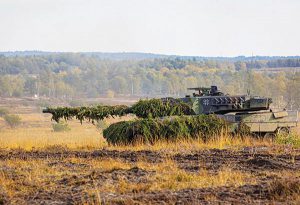Bloomberg
Germany is nearing a decision to send infantry fighting vehicles to help Ukraine fight off Russia’s military invasion as pressure mounts on Chancellor Olaf Scholz to match commitments from France and the US.
The government in Berlin is in talks with allies to coordinate an announcement, which could come within days, according to people familiar with the matter. One option is to provide dozens of Marder combat vehicles
from industry stocks, said the people, who asked not to be identified because the discussions are private.
A decision hasn’t been finalised, but the talks are advanced, the people said. A meeting of defense officials in the so-called Ramstein format, which includes European Union and Nato allies, is scheduled for mid-January and could be an important milestone, one of the people said.
Scholz has come under renewed pressure from political allies in Germany to step up
efforts to support Ukraine with more heavy weapons after France pledged to deliver combat vehicles.
“It’s time to supply Ukraine at least with the Marder from industrial stocks directly,†Marcus Faber, a lawmaker and defense expert from the Free Democrats in Scholz’s three-way coalition, told Bloomberg.
Germany should already start training Ukrainian forces to operate the Marder and the Leopard battle tank, said Faber, who was in Kyiv for discussions with Ukrainian officials.
Scholz has so far resisted calls to directly supply modern fighting vehicles, arguing the policy must first be agreed with EU and Nato partners. Officials in Berlin have also expressed concern about actions that might provoke the Kremlin, a stance widely criticised in light of Russia’s brutal tactics in Ukraine.
German defense manufacturer Rheinmetall AG has refurbished 60 Marders over the past months. If the chancellery decides to give an export permit, the company could send them to Ukraine within a few weeks.
The Green party — a member of Scholz’s coalition which is traditionally pacifist — also urged the chancellor to rethink the government’s stance on heavy weapons.
“The decision from France is good,†Sara Nanni, a security
expert with the Greens in the lower house of parliament,
told the Sueddeutsche Zeitung
newspaper. “We should make
available to Ukraine what is feasible, including Leopards and Marders from industrial stocks.â€
In addition to French AMX-10 combat equipment, Ukraine is expecting to take delivery soon of Bradley Fighting Vehicles from the US, Andriy Melnyk, a deputy foreign minister, said.
The Bradley is considered an equivalent to Germany’s Marder, while the Leopard is seen comparable to the US Abrams main battle tank, which hasn’t been offered to Ukraine.
Saskia Esken, co-leader of Scholz’s Social Democrats, said the chancellor is in “close talks†with allies on tank deliveries and that those contacts would continue.
“And then we will also take appropriate decisions,†she said in an interview with broadcaster RTL/ntv, reiterating Germany’s broader commitment to keep supplying Ukraine with weapons “for as long as it takes.â€
Germany’s hesitant approach is connected with a lack of supplies for its own military after years of underfunding. Scholz put together a special debt-financed €100 billion ($106 billion) fund to upgrade the Bundeswehr’s equipment. That’s on top of the annual defense budget of some €50 billion, but the process will take time.
Scholz’s administration has also agreed swap deals with allies including Greece, Slovenia and Slovakia, under which those countries supply Soviet-era tanks that Germany will replace with more modern versions.
Germany has been one of the most generous supporters of Ukraine, sending billions of euros in financial support.
 The Gulf Time Newspaper One of the finest business newspapers in the UAE brought to you by our professional writers and editors.
The Gulf Time Newspaper One of the finest business newspapers in the UAE brought to you by our professional writers and editors.
